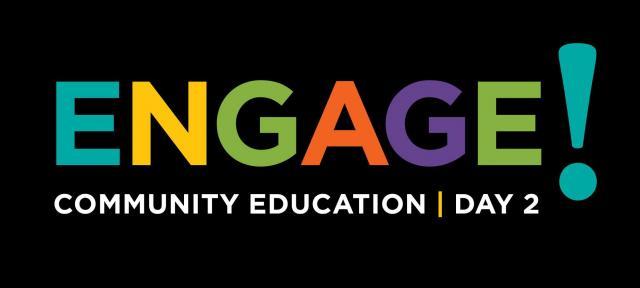Fourth-Annual ENGAGE! Conference Addressed Dismantling Violence

On October 7, Hampshire held its fourth-annual ENGAGE! Conference, a day when classes are canceled so that students, staff, and faculty may participate in interactive community education activities. The event doubled as Hampshire’s second day of Community Education, part of the new academic curriculum; the first was held on September 17. Sponsored by the Office of Institutional Diversity and Inclusion and the Community Commons, the event featured keynote speaker Ignacio Rivera and a number of workshops and panels on antiracism, particularly regarding dismantling anti-Blackness and offering survivor supports.
Ignacio Rivera, founder and executive director of the HEAL Project, presented the kick-off lecture, “Decolonizing Our Relations(hips): Healing Justice and Breaking the Cycle of Violence.” An internationally known Queer, Trans/Yamoká-hu/Two-Spirit, Black-Boricua, and Taíno speaker, educator, writer, and performer, Rivera (who uses they/them pronouns) has more than 20 years of experience facilitating economic justice, antiracist, and anti-violence work, as well as mujerista, LGBTQI, and sex-positive movements.
Rivera discussed their experience working toward ending child sexual abuse and how it relates to sexual liberation, then explained the concept of “healing justice,” developed by Hampshire alum Cara Page 88F, which identifies how we respond and intervene with intergenerational trauma — what is passed down to us by our families and culture. These primary themes inform their work at the HEAL Project.
This opened up an exploration of the ways children are often fed storybook romances, given one heteronormative sex talk, and not provided with information about their bodies or consent. Rivera presented their “Sexuality Model,” which centers holistic sexuality education and information within a framework of “intent and agency; power and oppression; health and culture; and history and vision” with connections to self, family, community, and society.
Structural violence — rape, genocide, separation, war, and systemic oppression — were highlighted as creating the conditions in which all other violence occurs. Rivera noted the recent cultural shifts taking place, such as acknowledging Indigenous land, recognizing trans identities, talking about anti-Blackness, and how people are finally seeing the way they’re all connected.
“It is the responsibility of all of us to rethink the way we show up for other people,” they said, “how we relate to one another, our relationships to all creatures and the world around us.”
The afternoon was packed with related events. Janvieve Williams Comrie, executive director of AfroResistance, led a three-hour interactive workshop, “Dominant Culture and the Individual in the Current Historical Moment,” which asked these questions: What is dominant culture and how do we each manifest it in our daily lives? What is our positioning and role in shaping dominant culture? How do we uphold, replicate, or challenge dominant culture? How do we challenge ourselves in the fight against racism?
A “Socially Engaged Theater” track was offered for those interested in connecting theater, social justice, and community healing. Taiga Christie, an ensemble theater director, street medic, and health worker, led the workshop “Brave Spaces: Preventing Sexual Violence in Creative Space.” Hampshire alums Kai Blackheart and Yijie Zhu (looking up class years) facilitated “Tools for Action: An Introduction to Forum Theater” in which participants learned of activities from Theatre of the Oppressed that can be used to discuss the underlying power dynamics of racism. The use of “forum theatre,” a practice developed by Augusto Boal, was also demonstrated to be used by communities to address systemic issues of inequality.
Hampshire staff, faculty, and students led several workshops, too:
- Karina Fernandez and Judah Doty offered “Wellness During a Pandemic.”
- Zauyah Waite, Mary Bombardier, Amy Jordan, and Pam Tinto presented “Voter Registration, Voting Power!”
- Will Syldor-Severino hosted “Community Desires,” to move participants from a directive, future-facing practice (use “I” statements), to a present-focused, exploration-based practice (I want to feel seen and heard).
- Naya Gabriel discussed “Creative Resilience,” ways to build community and explore our ideas about wellness, resilience, and identity through art-making and dialogue (both verbal and nonverbal).
- Aaron Richardson and Will MacAdams facilitated “Vulnerability, Showing Up Fully: A Workshop for Masculine Identified Folx.”
- Teal Van Dyck and Voula O’Grady led “You Make Me Feel Mighty Real: Queer Consent, Queer Relationality.”
- Taylor Donahue and Arielle Wortzel presented “Empathic Listening to Support Survivors and Your Greater Community,” an informative and interactive space to learn and practice different mindful- and conscious-listening tools and skills when engaging in conversations with our peers to help create a supportive community.
The final Community Education Day of the semester was held on October 20. With the theme “Organizing, Reflection, and Resilience: Re-Imagining Collective Care Before the Election and Beyond,” it featured workshops, panels, story circles, and other activities supporting the Hampshire community with opportunities to learn and connect around the upcoming presidential election.

